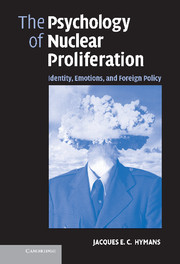Book contents
- Frontmatter
- Contents
- List of figures
- List of tables
- Preface
- List of acronyms and abbreviations
- 1 Introduction: life in a nuclear-capable crowd
- 2 Leaders' national identity conceptions and nuclear choices
- 3 Measuring leaders' national identity conceptions
- 4 The struggle over the bomb in the French Fourth Republic
- 5 Australia's search for security: nuclear umbrella, armament, or abolition?
- 6 Argentina's nuclear ambition – and restraint
- 7 “We have a big bomb now”: India's nuclear U-turn
- 8 Conclusion: lessons for policy
- Appendix: Coding rules and results
- Bibliography
- Name index
- Subject index
6 - Argentina's nuclear ambition – and restraint
Published online by Cambridge University Press: 22 September 2009
- Frontmatter
- Contents
- List of figures
- List of tables
- Preface
- List of acronyms and abbreviations
- 1 Introduction: life in a nuclear-capable crowd
- 2 Leaders' national identity conceptions and nuclear choices
- 3 Measuring leaders' national identity conceptions
- 4 The struggle over the bomb in the French Fourth Republic
- 5 Australia's search for security: nuclear umbrella, armament, or abolition?
- 6 Argentina's nuclear ambition – and restraint
- 7 “We have a big bomb now”: India's nuclear U-turn
- 8 Conclusion: lessons for policy
- Appendix: Coding rules and results
- Bibliography
- Name index
- Subject index
Summary
Introduction
According to conventional wisdom, Argentina's nuclear stances before the 1990s – pursuit of maximum technological autonomy combined with resistance to the non-proliferation regime – clearly indicate that it harbored a desire to build the bomb. Argentina's subsequent decisions to curtail its nuclear program and to join the regime are therefore seen as major successes in the struggle against proliferation. But this chapter shows that Argentina's policies were not motivated by nuclear weapons ambitions. Indeed, it is hard to find any significant actor in the Argentine political landscape who was motivated by such a desire. What is more, the main consequence of non-proliferation pressures until the 1990s was in fact to incite the Argentines further to acquire the very technologies that the North Americans wanted to deny them.
The basic argument of this chapter is that Argentina's mix of nuclear policies before the 1990s stemmed fundamentally from a sportsmanlike nationalist NIC that was held by a long succession of presidents from different parties and regime types, and that also had a wide resonance in the Argentine state and society as a whole. It was this widely held sportsmanlike nationalist NIC that produced the country's prideful rejection of the non-proliferation regime and the pursuit of nuclear autonomy, while at the same time engendering the view that an Argentine bomb would be a strategic absurdity.
While the evidence from Argentina generally supports the theoretical perspective adopted in this book, it represents an important anomaly for the other major theoretical perspectives on proliferation.
- Type
- Chapter
- Information
- The Psychology of Nuclear ProliferationIdentity, Emotions and Foreign Policy, pp. 141 - 170Publisher: Cambridge University PressPrint publication year: 2006



